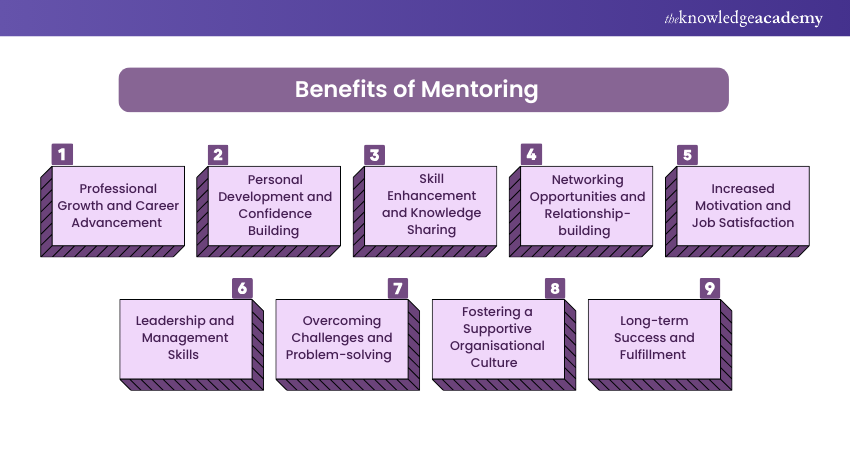We may not have the course you’re looking for. If you enquire or give us a call on 01344203999 and speak to our training experts, we may still be able to help with your training requirements.
Training Outcomes Within Your Budget!
We ensure quality, budget-alignment, and timely delivery by our expert instructors.

Do you find yourself lost while making important decisions in your life, especially regarding your career? Or do you want to become a Mentor and help people? Then, looking for a Mentor or becoming a good Mentor is crucial. There are numerous Benefits of Mentoring that will help both the Mentee and the Mentor when they want to make important decisions in life.
Mentoring can help one discover critical lessons, foster self-confidence, and develop different abilities. Mentees benefit from the exquisite knowledge and expertise of their Mentors, while the latter get the pleasure of coaching or refreshing their coaching skills. The Role of a Mentor is crucial in promoting a good work environment, effective knowledge utilization, potential development, and results achievement.
Are you curious to learn about the Benefits of Mentoring? Then read this blog further to learn more about them!
Table of Contents
1) Benefits of Mentoring
a) Professional growth and career advancement
b) Personal development and confidence building
c) Skill enhancement and knowledge sharing
d) Networking opportunities and relationship-building
e) increased motivation and job satisfaction
f) Leadership and management skills for Mentors
g) Overcoming challenges and problem-solving
h) Fostering a supportive organisational culture
i) Long-term success and fulfilment
2) Conclusion
What are the Benefits of Mentoring to a Mentee?
Mentoring has several Benefits that both the Mentors and the Mentees can utilise to create a good work environment. These are some of the following benefits:

Professional Growth and Career Advancement
Professional coaching is extremely valuable in one’s career and personal development. Mentees can also learn from their Mentors about new trends, practices, and other crucial skills needed in the job market to advance in their careers. Mentors share advice on managing workplace issues, setting goals and directions for their careers, and establishing a plan for establishing a successful career.
This Mentorship enables the Mentees to know and seize opportunities they could not have known were available, such as promotion or new positions. In addition, a mentor is in the position of providing the Mentees with contacts that are not easily reachable from the outside. For the Mentors, the process of Mentoring is also beneficial for one’s career advancement.
It provides the necessary leadership, coaching, and management training for employees to perform optimally within their organisations. Therefore, this arrangement to support professional development and career enhancement is a win-win for both the Mentor and the Mentee.
Personal Development and Confidence Building
Self-improvement and confidence building are some of the critical benefits of Mentoring. Through daily interactions with the Mentors, the Mentees are often encouraged and motivated, which helps eliminate their self-doubt. Mentors guide the Mentees and offer a platform on which they can be challenged and discuss their strengths and weaknesses.
Apart from improving the profile of the Mentees, Mentoring also enables them to learn behaviours that could help them overcome future challenges. For Mentors, helping or supporting others can make them feel more productive and valuable. They also feel good seeing their protégés growing and succeeding, positively influencing their self-esteem and personal growth.
Skill Enhancement and Knowledge Sharing
Mentoring is one of the most effective ways of training and knowledge sharing. Mentees can benefit from the knowledge and skills gained through the Mentoring process. Understanding the Different Types of Mentoring can help mentees choose the approach that best suits their needs. This can expand their knowledge, improve their skills, and gain additional insights about their industry.
Tips, proven strategies, simulated exercises, and case studies enhance Mentees' skills. A Mentor can also guide a Mentee in learning new methods, tools, and techniques that can interest the former's career path. Furthermore, the information exchange between a Mentor and a Mentee is crucial for the Mentees to become successful.
Mentors provide knowledge, industry advice, and suggestions based on their experience. They also assist their Mentees in avoiding mistakes and making better decisions. For Mentors, education, training, and passing knowledge increases authority and helps them stay updated on recent trends and innovations. Sharing skills and regular tutoring promotes learning and enhancement of professional growth.
Networking Opportunities and Relationship-building
Mentoring proves to be an effective way of networking and relationship-building. Mentees can tap into their designated Mentors’ professional circles, including business connections, possible partners and key influencers. This wide range of connections can help them create new employment prospects, collaborations, and promotions that could not have been possible otherwise.
Mentors can help connect Mentees and professional people in their line of work- to provide for their professional needs and possibly any prospects. However, the relationship between a Mentor and a Mentee is another critical connection. It is founded on trust, respect, and communication.
To the Mentors, Mentoring presents an opportunity to get connected to those within the Mentees’ networks by keeping up-to-date with new talents and developments within their industry. This mutually beneficial process positively impacts the social interaction between the Mentors and the Mentees by creating a professional support network.
Gain the skills to deliver impactful training sessions with our Train the Trainer Course – register now!
Increased Motivation and Job Satisfaction
The significant advantages of having a Mentor/Mentee relationship include higher motivation levels and employee satisfaction. Mentees also discover that by having a Mentor, they can get a direction in what they want to pursue within their career paths. A good example is when a Mentor encourages a Mentee so that the latter will have the desired motivation to pursue and achieve relevant career objectives.
This increased motivation can translate into better job performance and increased satisfaction with their work. Mentoring is an enriching experience for Mentors. Seeing the Mentee's progress and success can inspire a Mentor and help them rediscover the things they enjoy doing.
Contributing to another person and making a change for the better in their career brings meaning and achievement into their working life. Mentoring increases staff satisfaction and performance, especially in organisations that promote this environment.
Leadership and Management Skills
A powerful avenue for developing leadership and management skills, Mentoring involves coaching and supporting Mentees. For Mentors, active listening, constructive feedback, and providing suggestions are essential aspects of leadership. Additionally, Mentoring encompasses goal-setting, monitoring progress, and guiding Mentees through challenges—skills that align with effective management.
Through Mentoring, Mentors enhance their ability to recognise and nurture talent, thereby strengthening their leadership capabilities. Furthermore, the Mentoring process contributes to personal growth by exposing Mentors to diverse work approaches, difficulties, and Problem-solving strategies. This continuous development enriches both Mentors and their organisations.
Overcoming Challenges and Problem-solving
Mentoring remains one of the best strategies for coping with challenges or improving problem-solving skills. Mentees receive tremendous value from their Mentor, who provides a wealth of knowledge and advises them on avoiding pitfalls that may ensue in certain circumstances. They can advise the Mentee on issues they might not have considered earlier and develop new solutions from their experience.
This guidance allows the Mentees to cultivate the ability to think critically and solve problems, which is essential in any line of work. Mentorship also entails a close working relationship that makes the Mentees comfortable when they want assistance with their problems. Mentees develop problem-solving skills, which helps them increase their confidence in their knowledge of the problem.
Fostering a Supportive Organisational Culture
Mentoring plays a central role in promoting a supportive organisational culture. By fostering and supporting Mentoring, organisations create enabling environments that enhance learning and working partnerships among members. Mentoring enhances the employee’s sense of organisational membership and thus becomes a tool for reinforcing organisational commitment and satisfaction.
This practice reduces compartmentalisation and increases the dissemination of information and effective practices within company departments and across organisational hierarchies. This flow promotes improved efficiency and creativity in general organisational processes.
From a Mentor’s perspective, involvement in Mentoring programs shows that one is willing to be of value and to be involved in the growth of others, which may lead to an increased sense of meaning and self-actualisation.
Long-term Success and Fulfillment
The long-term rewards and lessons learned from Mentoring are numerous and significant. For a Mentee, social interaction with the Mentor has significant benefits in achieving their career goals. Mentoring has been shown to enhance the skills, knowledge, and confidence of the beneficiary in their quest to attain long-term organisational objectives and career paths.
Conversely, Mentors get the feeling of fulfilment that comes with preparing and launching someone to be a valuable addition to the world and the workplace. This sense of fulfilment could improve their careers and their quality of life. From the above discussion, the organisations that invest in the process of Mentoring end up having a motivated, competent and dedicated workforce that will enhance the organisation's success in the long run.
Discover the difference between coaching and mentoring to choose the best path for your development.
Conclusion
We hope that this blog has taught you about the numerous Benefits of Mentoring to both the Mentor and the Mentee. The Mentoring process helps Mentees gain confidence, and Mentors enhance their leadership and management capabilities. It is a journey that transcends the transfer of knowledge, fostering growth, confidence, and connectivity in a world that thrives on collaboration.
Want to know how you can motivate your team members and employees? Then join us now for our Mentoring Training!
Frequently Asked Questions

Mentoring is powerful because it fosters personal and professional growth, enhances skills, builds confidence, and creates valuable networks.

Being a Mentor bestows the gratification of shaping future leaders. It’s a chance to refine one’s skills, gain fresh perspectives, and solidify one’s legacy by passing on knowledge and experience.

The Knowledge Academy takes global learning to new heights, offering over 30,000 online courses across 490+ locations in 220 countries. This expansive reach ensures accessibility and convenience for learners worldwide.
Alongside our diverse Online Course Catalogue, encompassing 17 major categories, we go the extra mile by providing a plethora of free educational Online Resources like News updates, Blogs, videos, webinars, and interview questions. Tailoring learning experiences further, professionals can maximise value with customisable Course Bundles of TKA.

The Knowledge Academy’s Knowledge Pass, a prepaid voucher, adds another layer of flexibility, allowing course bookings over a 12-month period. Join us on a journey where education knows no bounds.

The Knowledge Academy offers various Train the Trainer Courses, including Mentoring Training, Coaching Skills Training and many more. These courses cater to different skill levels, providing comprehensive insights into Mentoring Skills methodologies in general.
Our Business Skills Blogs cover a range of topics related to Leadership, offering valuable resources, best practices, and industry insights. Whether you are a beginner or looking to advance your Mentoring Skills, The Knowledge Academy's diverse courses and informative blogs have you covered.
Upcoming Business Skills Resources Batches & Dates
Date
 Train the Trainer
Train the Trainer
Fri 21st Feb 2025
Fri 25th Apr 2025
Fri 20th Jun 2025
Fri 15th Aug 2025
Fri 17th Oct 2025
Fri 19th Dec 2025







 Top Rated Course
Top Rated Course



 If you wish to make any changes to your course, please
If you wish to make any changes to your course, please


